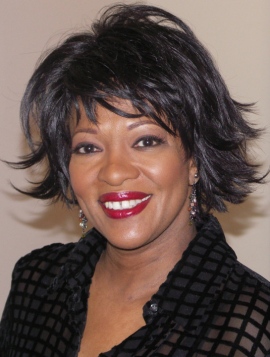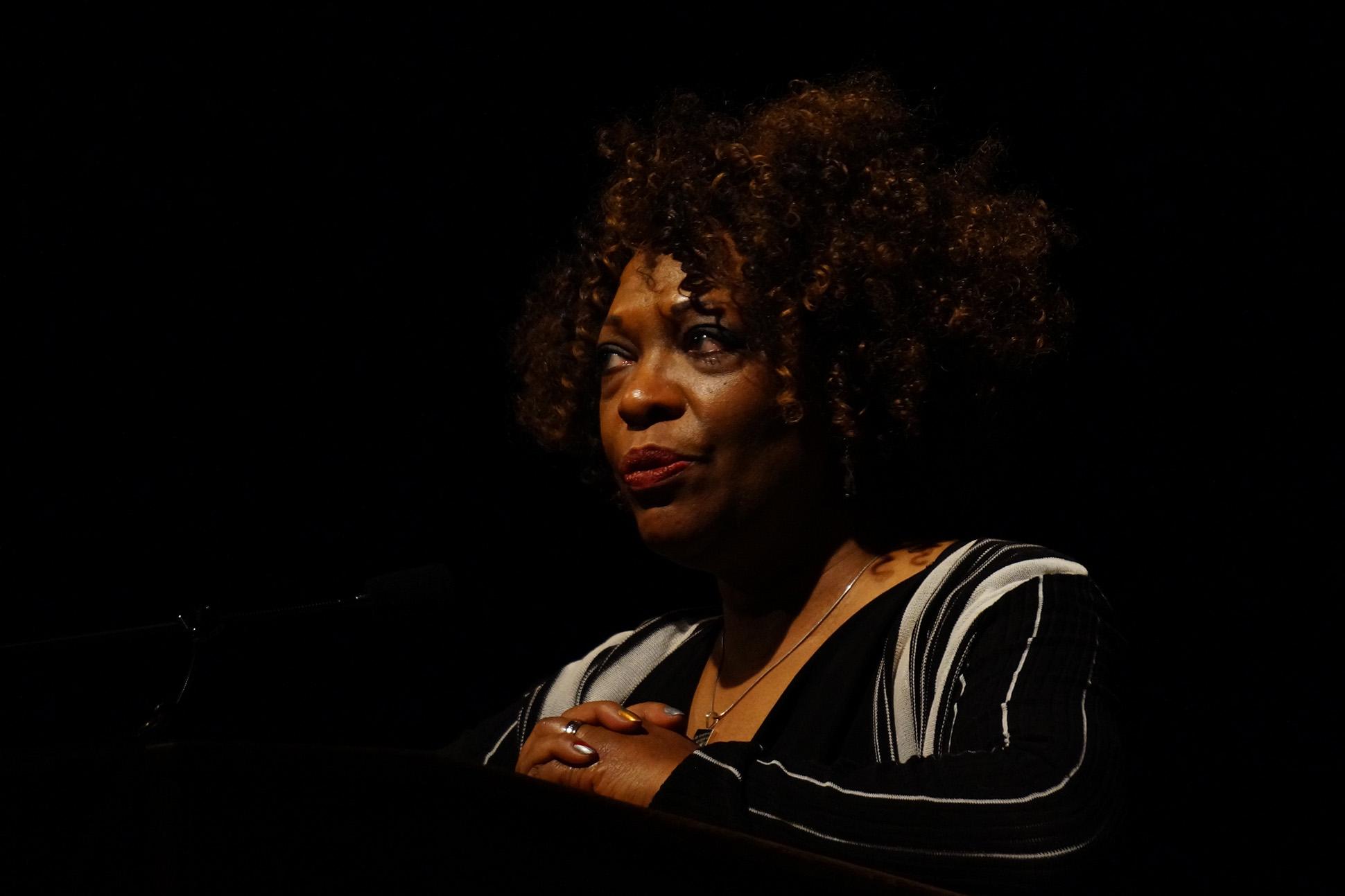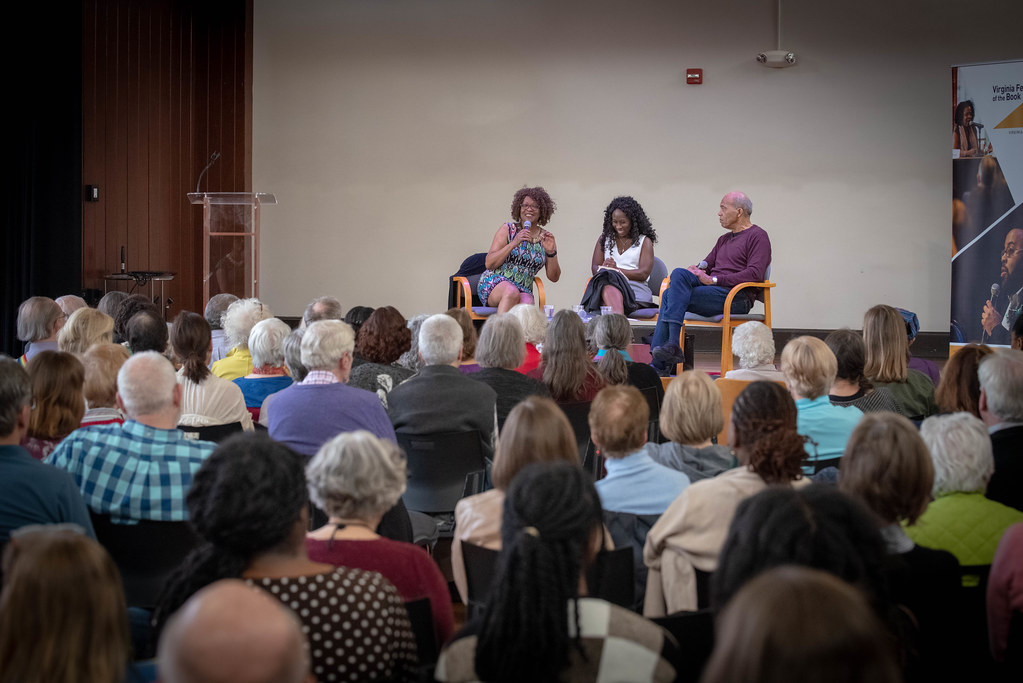Few modern poets range as widely through time and geography as Rita Dove, the former U.S. poet laureate. But when she took the stage of the Ohio Theatre in downtown Cleveland April 11, the evening had the sweet tang of home.
“It’s always good to come back,” she said, 60 years after her birth in Akron. “There is something in the Midwest — particularly in Northeast Ohio — that never leaves your system. I come back and immediately I fall into the cadences of the Midwest.”
Dove, whose musical alto drew an audience of more than 700, grew up immersed in the Complete Works of William Shakespeare, during a childhood that also made room for fractal geometry and “Harold and the Purple Crayon.” Ronald B. Richard, president of the Cleveland Foundation, noted that the 1955 children’s picture book influenced the poet’s “sense of color and space, two primary concepts in her poetry.” As he introduced Dove, Richard praised her instrumental work as a juror for the Anisfield-Wolf Book Awards.
Dove told her audience that her creativity “starts with a line, not a grand idea. It’s an ache, an absence that I am trying to fill.”
The evening flowed chronologically through Dove’s nine poetry collections. She began with “Geometry,” a poem that reflects her love for mathematics, and one, she told the audience, that also grapples with its limits:
I prove a theorem and the house expands:
the windows jerk free to hover near the ceiling,
the ceiling floats away with a sigh.
As the walls clear themselves of everything
but transparency, the scent of carnations
leaves with them. I am out in the open
and above the windows have hinged into butterflies,
sunlight glinting where they’ve intersected.
They are going to some point true and unproven.
From her second book, “Museum,” Dove selected “Parsley,” a two-part poem that addresses the mind of Rafael Trujillo, the dictator of the Dominican Republic who in 1937 ordered the slaughter of 20,000 black Haitians. (Trujillo figures prominently in Junot Diaz’s novel, “The Brief Wondrous Life of Oscar Wao,” which earned an Anisfield-Wolf award in 2008.)
Trujillo chose death for those who could not pronounce the rolling letter “r” in perejil, the Spanish word for parsley. As Dove explained this background, she encapsulated the horror: “Evil can be creative.”
Arthur Evenchik, who helps run the SAGES Fellows program at Case Western Reserve University, bought a ticket to hear Dove partly because of her work in “Museum.” He said he found out about her appearance from a SAGES instructor, Mary Holmes:
“Mary and I had never talked about poetry, and I didn’t know it was one of her interests,” Evenchik said in an email. “ But on this particular day, she mentioned lines from . . . a poem titled ‘Grape Sherbet,’ in which Dove recalls her father’s tradition of making dessert for Memorial Day picnics:
The diabetic grandmother
stares from the porch,
a torch
of pure refusal.
Evenchik continued: “Mary and I had just met up by chance on one of the quads when we had this conversation. It was wonderful to learn that we both carried this image in our heads, that Dove’s work had made such an impression on us both.”
The impression was heightened by hearing the words in Dove’s mouth, standing at a lectern with a stack of books, her hands often aloft, open, gesturing the music of the phrasing.
Dove turned her palms upward when she mentioned her initial doubts about “Thomas and Beulah,” a book that won a Pulitzer Prize in 1987. “I thought, will anyone want to read about Akron? And then I remembered Rilke’s ‘Letters to a Young Poet’:
“If your daily life seems poor, do not blame it; blame yourself, tell yourself that you are not poet enough to call forth its riches; for to the creator there is no poverty and no poor indifferent place.”
Dove then read “Daystar,” a short poem about a young mother seeking a moment of peace. It ends:
Later
that night, when Thomas rolled over and
lurched into her, she would open her eyes
and think of the place that was hers
for an hour — where
she was nothing,
pure nothing, in the middle of the day.
The audience response caused Dove to smile and say, “The mothers are applauding.” She paused to praise the Cuyahoga County Public Library, which sponsored her talk. Her gratitude took its form in what Dove often calls her “love poem to libraries”: “Maple Valley Branch Library, 1967.” She told the audience that was the year her parents wrote a note to the staff to let their daughter check out anything she wanted.
Watch Rita Dove read “Maple Valley Branch Library, 1967” in the video below.
Some of the fruit of that reading may well have nourished the pointed poem “Hattie McDaniel Arrives at the Coconut Grove,” set during the 1940 Academy Awards, when the actress won an Oscar for her performance as a maid in “Gone With the Wind.” Dove’s poem contains this question:
What can she be
thinking of? Striding into the ballroom
where no black face has ever showed itself
except above a serving tray?
Dove spent the rest of the evening dwelling on her latest title, “Sonata Mulattica,” a book-length cycle telling the story of the 19th century African-European violinist George Polgreen Bridgetower and his turbulent friendship with Ludwig van Beethoven. As with all her work, the attention to detail threads through a profound feel for history. Dove said the most difficult part of the work was freeing Beethoven from the plaster cast modern readers picture when thinking of him.
Dove, who wore a brilliant turquoise dress, acknowledged her relatives in the crowd, and read a new poem called “Reunion.” It begins: “Thirty seconds into the barbecue/my Cleveland cousins have everyone/speaking Southern.”
The sense of family was palpable, even for those whose kinship was aesthetic. “I felt that I was surrounded by fellow readers who appreciate her writing as much as I do,” Evenchik remarked. “That was a privilege almost as great as hearing Dove herself. “
As for Dove, she was generous and encouraging to the students who flocked to her after the performance. “Read your butt off,” she told them. “Read, read, read. Nothing is too low or too high. If you don’t love reading, you can’t love writing.
“The other advice is: live. Writing is about life, it is not about literature.”



